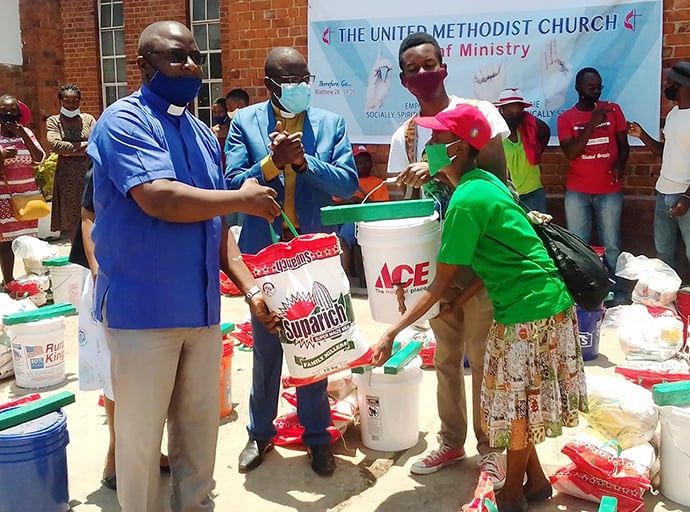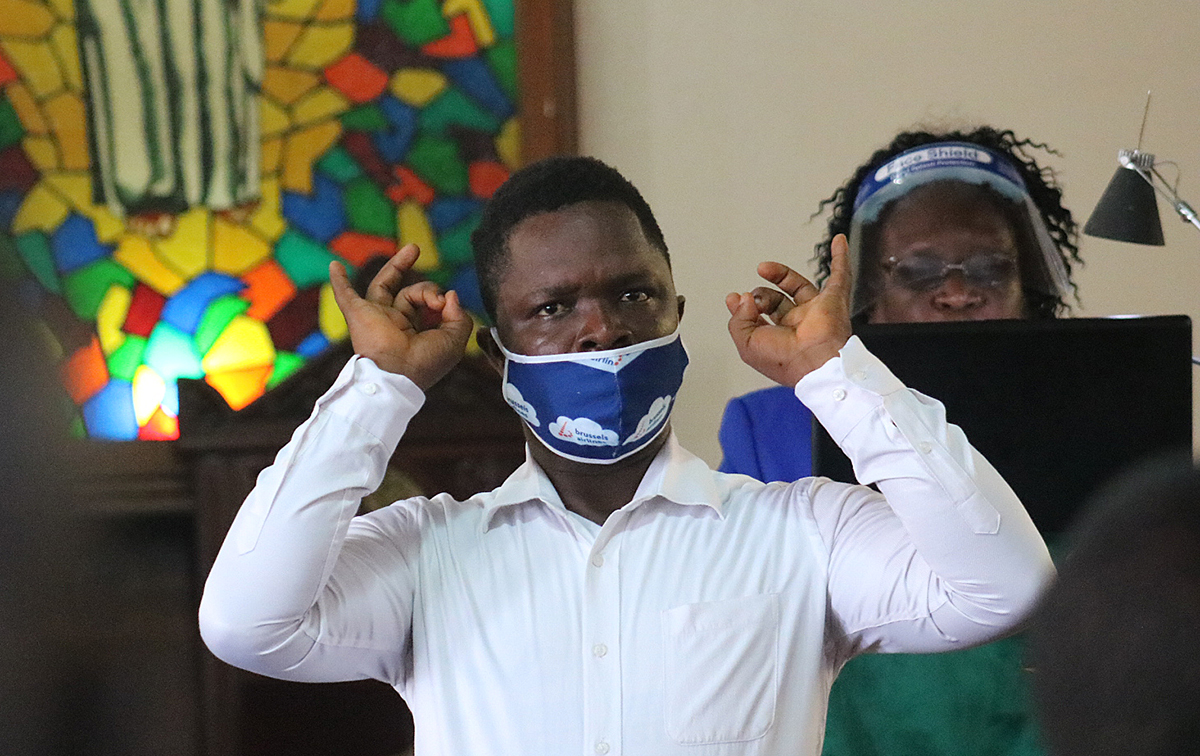The United Methodist Church has ensured that Deaf members in Zimbabwe and Liberia have adequate resources and information to fight the coronavirus.
A $5,000 Sheltering in Love grant from the United Methodist Committee on Relief enabled Hilltop United Methodist Church in Mutare, Zimbabwe, to provide protective materials such as washable face masks, handwashing buckets and liquid soap to more than 60 households with Deaf members. Over 200 people benefitted from the donation.
UMCOR’s Sheltering in Love Rapid Response program for COVID-19 relief has provided over $2.3 million in grants in 54 episcopal areas, 43 countries and 43 U.S. states and territories.
In Zimbabwe, the grant also purchased internet bundles to ensure that the Deaf community was well informed about COVID-19 and able to follow worship services that were streamed on the church Facebook page. Every service at the church has a sign language interpreter.
“Part of the grant was used for skills training, and six Deaf members together with eight hearing members attended training on how to make petroleum jelly and liquid soap,” said Raymond Makuwaza, the Hilltop Deaf Ministry outreach program director.
He said the program was aimed at equipping the Deaf community with skills they can use to sustain their families.
Hilltop pastor-in-charge, the Rev. Chrispen Musuruware, said the products from the skills workshop were given to the participants. The training produced 140 liters of liquid soap and 108 bottles of petroleum jelly.

The Deaf members also received food hampers as the pandemic has resulted in most of them losing their jobs or sources of livelihood due to national lockdowns.
Munashe Matombo, 29, is one of the Deaf members who attended the skills training.
“I am now able to make petroleum jelly and if I get capital, I intend to start an income-generating project from this training,” he said.
Matombo is married and has one child.
Hilltop United Methodist Church has the most vibrant Deaf ministry in the Zimbabwe East Conference with over 60 members at the church and neighboring United Methodist churches in Mutare, and 15 sign language interpreters, some of whom have been serving this unique ministry since 2004.
The church has established a special relationship with Collins Prempeh, the only Deaf student studying at Africa University.
Tonderai Makaya, a member of Hilltop, assists Prempeh with interpretation during classes at the United Methodist university.
“I assist Collins and the lecturers for they are not able to communicate with their Deaf student during lectures,” Makaya said.
Lovers Lane United Methodist Church in Dallas, Texas, is funding Prempeh’s education and welfare at the institution.

When Zimbabwe was under total lockdown in an effort to contain the coronavirus pandemic, it was difficult for Makaya to travel to AU to assist Prempeh.
“It was very challenging for us. He wasn’t allowed out of campus and I wasn’t allowed in. So we used WhatsApp messaging when he needed assistance,” said Makaya.
The travel restrictions have since been relaxed.
“I have a fine relationship with Hilltop. I attend church services and worship with them,” Prempeh said.
“I have preached to the Deaf Ministry, which was separated from hearing members. I would like to help them through God’s word, but services were stopped due to COVID-19,” he said.
In Liberia, hundreds of Deaf community members are receiving both spiritual and physical services from S.T. Nagbe United Methodist Church during the COVID-19 pandemic.
According to the church’s pastor, the Rev. Matthew A. Jaiah, members of the community who attend the church were given food items at the height of the coronavirus pandemic while others were assisted with their health needs.
“The church is the only place they can depend on in these troubled times,” Jaiah noted.
He said the church has dedicated the early Sunday morning worship service to meeting the spiritual needs of the Deaf community, adding, “we need to treat them like equals or else they will have broken spirits when it comes to our human interactions.”
He pointed out that during the early worship service, time and space is given to them to express themselves freely. Jaiah stressed that they sometimes take charge of the worship from Scripture readings, preaching and Bible study.
Subscribe to our
e-newsletter
S.T. Nagbe United Methodist Church is home to hundreds of Deaf community members along with other physically challenged individuals.
The church provides a monthly transportation allowance for the physically challenged community as a way of encouraging them to come to church regularly.
“This is the only church in the Liberia Annual Conference that is providing them with the opportunity to worship God freely,” said David T. Worlobah, director of the conference hearing-impaired department.
He said the church and the state need to pay attention to the needs of the physically challenged in Liberia.
Worlobah said his department is collaborating with United Methodist University to introduce sign language in the curriculum of the university as a way of encouraging more Liberians to interact with the Deaf community.
“The program is basically for people without speech or hearing impairment,” Worlobah said. He indicated that his office is trying to recruit individuals who are willing to undergo sign language training in Ghana.
Chikwanah is a communicator in Zimbabwe. Swen is a communicator in Liberia.
News media contact: Vicki Brown at (615) 742-5470 or [email protected]. To read more United Methodist news, subscribe to the free Daily or Weekly Digests.
Like what you're reading? Support the ministry of UM News! Your support ensures the latest denominational news, dynamic stories and informative articles will continue to connect our global community. Make a tax-deductible donation at ResourceUMC.org/GiveUMCom.




